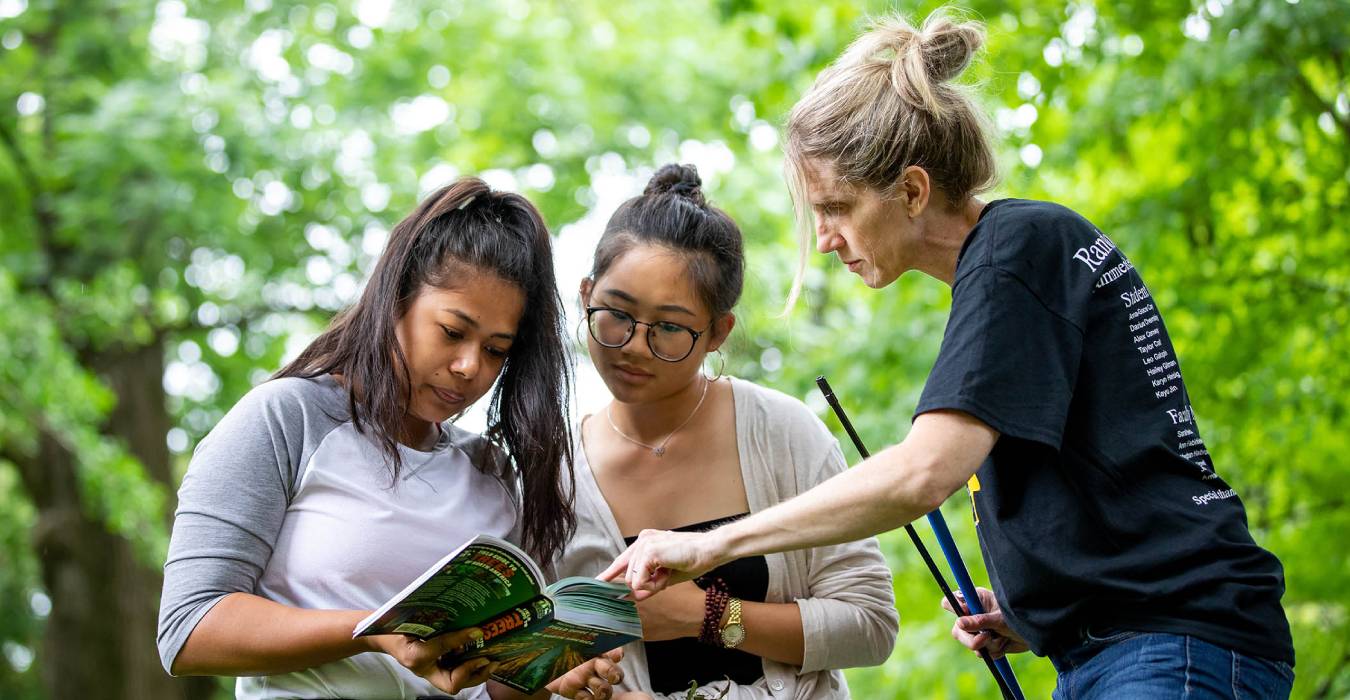A bachelor’s degree is a great way to further your education and take the first step to preparing for your future career. A bachelor’s path of study can give you a more hands-on experience and may or may not restrict your course options to those directly related to your field of study. Environmental scientists help businesses and governments understand and make informed decisions about how to preserve natural ecosystems and resources, and how to balance the needs of humans and natural world. In this program you'll learn about plant ecology, chemistry, hydrology, soil rehabilitation, climate change, coastal studies, geospatial sciences and conservation and restoration. Study the interaction between natural and human-managed environments and develop skills in environmental monitoring and advanced research methods.




In this program you will:
- Develop skills in advanced research methods
- Use technology such as spatial analysis and drones to gain industry-ready skills
- Participate in field trips to USC research sites
- Learn how to solve complex environmental problems
- Choose an area of interest from a range of options including Environmental Management, Sustainability and more
Course Structure
You take a combination of compulsory and concentration modules to a total of 240 credits. The first two years introduces you to the essential concepts and methods of Environmental terms, while the following two years build on that knowledge and allow you to study core subjects in depth.
In Year 1, you take 8 compulsory 60-credit modulesIn Year 2, you take 8 compulsory 60-credit modules
In Year 3, you take 8 compulsory modules worth 60 credits and
In Year 4, you take 8 courses worth 48 credits with 1 mandatory research project modules worth 12 credits.
| Year 1 (Semester 1) | ||
|---|---|---|
| CODE | Module | ECTS |
| BES 111 | Introduction to Environmental Science | 6 |
| BES 112 | Statistics for Environmental Science and Management | 8 |
| BES 113 | Introduction to Economics | 6 |
| BES 114 | Introduction to Geography | 8 |
| Sub Total | 28 | |
| Year 1 (Semester 2) | ||
| CODE | Module | ECTS |
| BES 121 | Environmental Biology | 8 |
| BES 122 | Environmental Ecology | 8 |
| BES 123 | Hydrology and Water Resources | 8 |
| BES 124 | Water Pollution | 8 |
| Sub Total | 32 | |
| Year 2 (Semester 1) | ||
| CODE | Module | ECTS |
| BES 211 | Environmental Engineering | 6 |
| BES 212 | Environmental Microbiology | 8 |
| BES 213 | Biodiversity Conservation | 6 |
| BES 214 | Atmospheric and Oceanic Environment | 8 |
| Sub Total | 28 | |
| Year 2 (Semester 2) | ||
| CODE | Module | ECTS |
| BES 221 | Air Pollution & Climate Change | 8 |
| BES 222 | Water Resource Management | 8 |
| BES 223 | Energy and Environment | 8 |
| BES 224 | Environmental Economics | 8 |
| Sub Total | 32 | |
| Year 3 (Semester 1) | ||
| CODE | Module | ECTS |
| BES 311 | Noise Pollution | 6 |
| BES 312 | Environmental Chemistry | 8 |
| BES 313 | Fundamentals of Earth Science | 6 |
| BES 314 | Agriculture and Land Resource Management | 8 |
| Sub Total | 28 | |
| Year 3 (Semester 2) | ||
| CODE | Module | ECTS |
| BES 321 | Remote Sensing and GIS | 8 |
| BES 322 | Environmental Impact Assessment | 8 |
| BES 323 | Environmental Hazards and Disaster Management | 8 |
| BES 324 | Environmental Health | 8 |
| Sub Total | 32 | |
| Year 4 (Semester 1) | ||
| CODE | Module | ECTS |
| BES 411 | Environmental Ethics | 6 |
| BES 412 | Waste Management | 6 |
| BES 413 | Computer Application in Environmental Science | 6 |
| BES 414 | People and Nature: An Introduction to Human Ecological Relation | 6 |
| Sub Total | 24 | |
| Year 4 (Semester 2) | ||
| CODE | Module | ECTS |
| BES 421 | Environmental Quality Management | 6 |
| BES 422 | Environmental Law, Policy and Administration | 6 |
| BES 423 | Forest Management | 6 |
| BES 424 | Industrial Ecology | 6 |
| Sub Total | 24 | |
| CODE | Independent Study | ECTS |
| BES 425 | Research Project | 12 |
ECTS (European Credit Transfer System)
Is an important element of the Bologna process, meant to help international students make the most of their study abroad experience. Initially, the ECTS was directed towards KMIT students, as a tool for acknowledging courses and programmes they studied while abroad.
Today, the ECTS is widespread all over Europe and it is also used for recognizing not just study exchange experiences, but full Bachelor's, Master's and Doctorate degrees as well.
THE STUDENT ENTRY QUALIFICATIONS
- Must have High School Diploma, GCE A-Level Passess, or equivalent qualification.
- Adults with lesser qualification but posses years' of experience in environmental science sector will also be considered.
Assessment and verification
We assess both the theoretical and practical elements of the course. Assessment is through written assignments, a profile of evidence of teaching standards and observed teaching. All modules within this program are internally assessed by the approved centers and externally verified by Azteca University. The qualifications are criterion referenced, based on the achievement of all the specified learning outcomes. To achieve a pass for a unit, learners must provide evidence to demonstrate that they have fulfilled all the learning outcomes and meet the standards specified by all assessment criteria. Judgment that the learners have successfully fulfilled the assessment criteria is made by the Assessor. The Assessor will provide an audit trail showing how the judgement of the learners’ overall achievement has been arrived at.
METHOD OF ASSESSMENT
Knowledge, understanding and intellectual skills are assessed through a combination of course assignments and presentations.
The weighting for the final overall assessment for each course taken shall be as follows:
- 90% Assignments
- 10% Presentation and viva
At the end of the program each student also submit a research project paper
Programme modality
The program is studied 100% online through the virtual learning platform with tutor support.
You will receive excellent support from the academic team, including your programme manager and your supervisor who will be with you every step of the way.
Duration
The programme is design to be delivered through 4 years but can be completed earlier.
EQUALITY AND DIVERSITY
Azteca University hhas adopted a policy of providing equal opportunities for its learners, staff, applicants and others involved in its work. One aspect of this policy is its intention to prevent, as far as possible, the harassment of one person by another, whether on the basis of gender, sexual orientation, sexuality, race or ethnic origin, religion, disability, or any other personal attributes or views held.
In this program you will:



